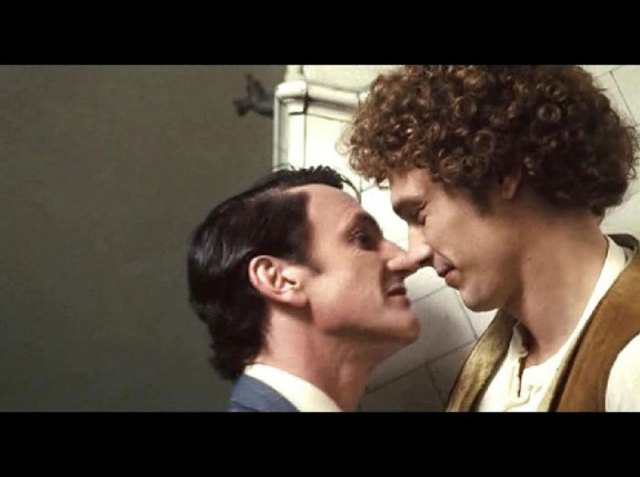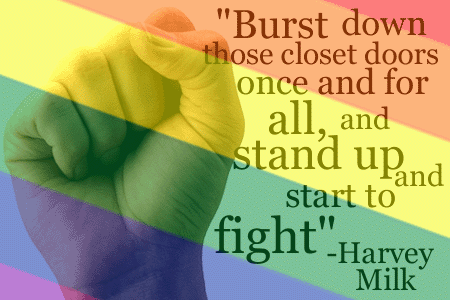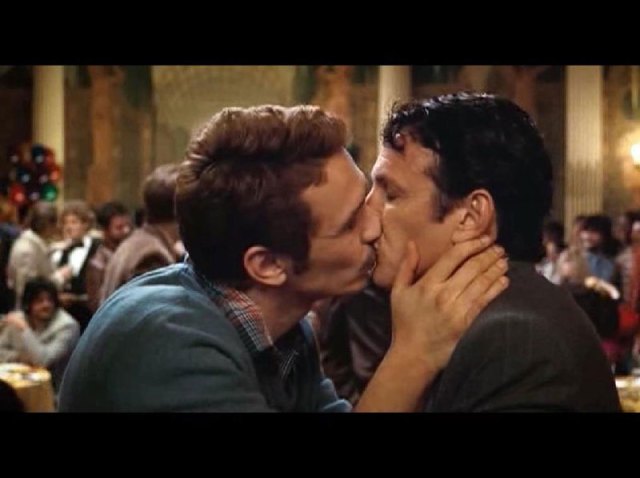
A 2008 biographical film on the life of gay rights activist and politician Harvey Milk, who was the first openly gay man to be elected to public office in California (as a member of the San Francisco Board of Supervisors). This movie is directed by Gus Van Sant, and stars Sean Penn as Milk, and Josh Brolin as Milk’s assassin, Supervisor Dan White. The film was acclaimed when released and earned numerous accolades from film critics and guilds. Ultimately, it received 8 Academy Award nominations, including Best Picture, winning two for Best Actor in a Leading Rolefor Penn and Best Original Screenplay for Dustin Lance Black.
Attempts to put Milk’s life to film followed a 1984 Oscar-winning documentary of his life and the aftermath of his assassination, titled The Times of Harvey Milk, which was loosely based upon Randy Shilts’ biography, The Mayor of Castro Street. Various scripts were considered in the early 1990s, but projects fell through for different reasons, until 2007. Much of Milk was filmed on Castro Street and various locations in San Francisco, including Milk’s former storefront, Castro Camera.
Milk begins on Harvey Milk’s 40th birthday, when he was living in New York and had not yet settled in San Francisco. It chronicles his foray into city politics, and the various battles he waged in the Castro neighborhood as well as throughout the city, and political campaigns to limit the rights of gay people in 1977 and 1978 run by Anita Bryant and John Briggs. His romantic and political relationships are also addressed, as is his tenuous affiliation with troubled Supervisor Dan White; the film ends with White’s double murder of Milk and Mayor George Moscone. The film’s release was tied to the 2008 California voter referendum on gay marriage, Proposition 8, when it made its premiere at the Castro Theater two weeks before election day.

Whats it about?
Spoiler alert . . . .
The movie starts with an archival footage of police raiding gay bars and arresting patrons during the 1950s and 1960s, followed by Dianne Feinstein’s November 27, 1978, announcement to the press that Supervisor Harvey Milk and Mayor George Moscone have been assassinated. Milk is seen recording his will throughout the film, nine days (November 18, 1978) before the assassinations. The film then flashes back to New York City in 1970, the eve of Milk’s 40th birthday and his first meeting with his much younger lover, Scott Smith.
Unsatisfied and in need of a change, Milk and Smith decide to move to San Francisco in the hope of finding larger acceptance of their relationship. They open Castro Camera in the heart of Eureka Valley, a working class neighborhood in the process of evolving into a predominantly gay neighborhood known as The Castro. Frustrated by the opposition they encounter in the once Irish-Catholic neighborhood, Milk utilizes his background as a businessman to become a gay activist, eventually becoming a mentor for Cleve Jones. Early on, Smith serves as Milk’s campaign manager, but his frustration grows with Milk’s obsessive devotion to politics, and he leaves him. Milk later meets Jack Lira, a sweet-natured but unbalanced young man. As with Smith, however, Lira cannot tolerate Milk’s devotion to political activism, and eventually hangs himself.
After two unsuccessful political campaigns in 1973 and 1975 to become a city supervisor and a third in 1976 for the California State Assembly, Milk finally wins a seat on the San Francisco Board of Supervisors in 1977 for District 5. His victory makes him the first openly gay man to be voted into major public office in the United States. Milk subsequently meets fellow Supervisor Dan White, a Vietnam veteran and former police officer and firefighter. White, who is politically and socially conservative, has a difficult relationship with Milk. He has a growing resentment for Milk, largely due to the attention paid to Milk by the press and his colleagues.
Milk and White forge a complex working relationship. Milk is invited to, and attends, the christening of White’s first child, and White asks for Milk’s assistance in preventing a psychiatric hospital from opening in White’s district, possibly in exchange for White’s support of Milk’s citywide gay rights ordinance. When Milk fails to support White, White feels betrayed, and ultimately becomes the sole vote against the gay rights ordinance. Milk also launches an effort to defeat Proposition 6, an initiative on the California state ballot in November 1978. Sponsored by John Briggs, a conservative state legislator from Orange County, Proposition 6 seeks to ban gays and lesbians (in addition to anyone who supports them) from working in California’s public schools. It is also part of a nationwide conservative movement that starts with the successful campaign headed by Anita Bryant and her organization Save Our Children inDade County, Florida to repeal a local gay rights ordinance. On November 7, 1978, after working tirelessly against Proposition 6, Milk and his supporters rejoice in the wake of its defeat. The increasingly unstable White is in favor of a supervisor pay raise, but does not get much support, and shortly after supporting the Proposition, resigns from the Board. He later changes his mind and asks the city to rescind his decision. Mayor George Moscone denies his request, after having been lobbied by Milk to do so.
On the morning of November 27, 1978, White enters San Francisco City Hall through a basement window in order to conceal a gun from metal detectors. He requests another meeting with Moscone, who rebuffs his request for re-appointment. Enraged, White shoots Moscone and then Milk. The film suggests that Milk believed that White might be a closeted gay man.
The film ends with an aerial shot of the candlelight vigil held by thousands for Milk and Moscone throughout the streets of the city.

Staring:
Sean Penn as Harvey Milk
Emile Hirsch as Cleve Jones
James Franco as Scott Smith
Josh Brolin as Dan White
Victor Garber as Mayor George Moscone
Denis O’Hare as Senator John Briggs
Diego Luna as Jack Lira
Critics
Milk received widespread acclaim from film critics.As of January 30, 2009, Rotten Tomatoes has given the film a 93% rating with a 184 fresh and fourteen rotten reviews. The average score is 8/10.At Metacritic, which assigns a normalized rating out of 100 to reviews from mainstream critics, the film has received an average score of 84, based on 38 reviews.

Todd McCarthy of Variety called the film “adroitly and tenderly observed,” “smartly handled,” and “most notable for the surprising and entirely winning performance by Sean Penn.” He added, “While Milk is unquestionably marked by many mandatory scenes . . . the quality of the writing, acting and directing generally invests them with the feel of real life and credible personal interchange, rather than of scripted stops along the way from aspiration to triumph to tragedy. And on a project whose greatest danger lay in its potential to come across as agenda-drivenagitprop, the filmmakers have crucially infused the story with qualities in very short supply today – gentleness and a humane embrace of all its characters.”

Kirk Honeycutt of The Hollywood Reporter said the film “transcends any single genre as a very human document that touches first and foremost on the need to give people hope” and added it “is superbly crafted, covering huge amounts of time, people and the zeitgeist without a moment of lapsed energy or inattention to detail . . . Black’s screenplay is based solely on his own original research and interviews, and it shows: The film is richly flavored with anecdotal incidents and details. Milk surfaces in a season filled with movies based on real lives, but this is the first one that inspires a sense of intimacy with its subjects.”

A.O. Scott of The New York Times called Milk, “A Marvel”, and wrote the film “is a fascinating, multi-layered history lesson. In its scale and visual variety it feels almost like a calmed-down Oliver Stone movie, stripped of hyperbole and Oedipal melodrama. But it is also a film that like Mr. Van Sant’s other recent work — and also, curiously, like David Fincher’s Zodiac, another San Francisco-based tale of the 1970s — respects the limits of psychological and sociological explanation.”

Christianity Today, a major progressive Christian-faith based periodical, gave the film a positive response. It stated that “Milk achieves what it sets out to do, telling an inspiring tale of one man’s quest to legitimize his identity, to give hope to his community. I’m not sure how well it’ll play outside of big cities, or if it will sway any opinions on hot-button political issues, but it gives a valiant, empathetic go of it.” It also stated that the portrayal of Dan White was very fair and humanized and portrayed as more of a flawed and tragically opinionated character, rather than a “typical ‘crazy Christian villain’ stereotype”.

In contrast, John Podhoretz of the neoconservative magazine Weekly Standard blasted the portrayal of Harvey Milk, saying that it treated the “smart, aggressive, purposefully offensive, press-savvy” activist like a “teddy bear”. Podhoretz also argued that the film glosses over Milk’s polyamorous relationships; he opined that this contrasts Milk from present day gay rights activists fighting over monogamous same-sex marriage.

Screenwriter and journalist Richard David Boyle, who described himself as a former political ally of Milk’s, stated that the film made a creditable effort of recreating the era. He also wrote that Penn captured Milk’s “smile and humanity”, and his sense of humor about his homosexuality. Boyle reserved criticism for what he felt was the film’s inability to tell the whole story of Milk’s election and demise.
The Advocate, while supporting the film in general, criticized the choice of Penn given the actor’s support for the government of Cuba despite the country’s anti-gay rights record Human Rights Foundation president Thor Halvorssen said in the article “that Sean Penn would be honored by anyone, let alone the gay community, for having stood by a dictator that put gays intoconcentration camps is mind-boggling.” Los Angeles Times film critic Patrick Goldstein commented in response to the controversy, “I’m not holding my breath that anyone will be holding Penn’s feet to the fire.”

Awards & nominations (everyone knows by now anyways!)
Milk had received accolades from several film critics organizations. On December 9, the film received eight Critic’s Choice Award nominations including Best Picture and Best Director. Two days later, Sean Penn received one Golden Globe nomination for Best Actor, the film’s only nomination. On December 18, the Screen Actors Guild nominated Milk on three categories: Best Actor, Best Supporting Actor and Best Cast in a Motion Picture for the 15th Screen Actors Guild Awards; Sean Penn was chosen as Best Actor. On January 5th, the film’s producers received a nomination for Producer of the Year for the 20th Producers Guild of America Awards; and on January 8th Gus Van Sant received a nomination for Outstanding Directorial Achievement for the 61st Directors Guild of America Awards. The film won Best Original Screenplay at the 62nd Writers Guild of America Awards and received four BAFTA award nominations, including Best Film, for the 62nd British Academy Film Awards. On January 22, 2009; Milk received 8 Academy Award nominations, including Best Picture, for the 81st Academy Awards, winning two for Best Original Screenplay and Best Actor in a Leading Role (Sean Penn).
Milk Trailer. . . now release “worldwide” ( thats if that country is open enough to allow screening ) What a Pity! sigh . . .




Great blog and hope to have some time soon to come back and read more!
I love your post!!! Did you listen to the NPR interveiw with Sean Penn about Milk?